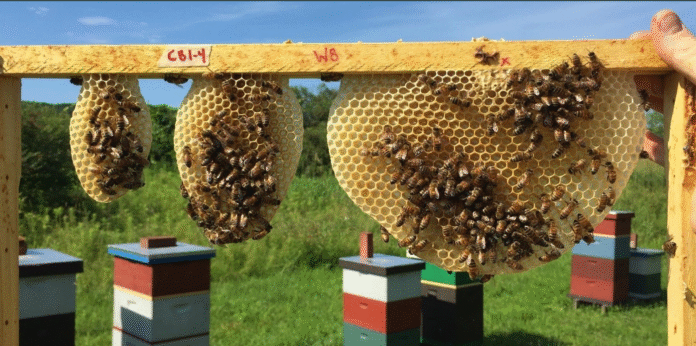Honeybee Superfood Breakthrough: A Lifeline for Pollinators
The honeybee superfood breakthrough is being hailed as a game-changing scientific development that could save bee colonies from collapse. Researchers from the University of Oxford, in collaboration with Royal Botanic Gardens Kew and other institutions, have created a nutrient-packed supplement designed to protect honeybees against climate change, habitat loss, and widespread colony decline.
Honeybees are critical to global food security, pollinating 70% of the world’s most important crops, including fruits, vegetables, and nuts. However, they face alarming population losses due to diseases, pesticides, and nutritional deficiencies.
This new honeybee superfood breakthrough may provide the missing link in bee nutrition and ensure the survival of pollinators that humanity depends on.
Why Honeybees Need a Superfood
Honeybees typically get essential nutrients from pollen and nectar. These contain sterols lipids necessary for their development. But in recent years, rising global temperatures, reduced flowering seasons, and pesticide-heavy farming have caused food shortages for bees.
Beekeepers often feed colonies artificial supplements made of sugar and protein flour. Unfortunately, these lack sterols and other critical micronutrients, making them nutritionally incomplete. Imagine humans surviving on fast food alone energy-rich, but missing vital vitamins.
Professor Geraldine Wright, lead researcher at Oxford, explained:
“This technological breakthrough provides all the nutrients bees need to survive, meaning we can continue to feed them even when there’s not enough pollen.”
The honeybee superfood breakthrough could prevent bees from starving during harsh winters and poor flowering seasons, reducing colony collapse rates.
How Scientists Created the Honeybee Superfood
Developing sterols for bee diets has been a scientific puzzle for decades. Prof. Wright and her team spent 15 years identifying the exact sterols bees need. Using gene-editing technology, her team engineered yeast capable of producing six essential sterols required for honeybee health.

PhD student Jennifer Chennells described the process as creating a “cookie dough” of proteins, fats, carbohydrates, and micronutrients, experimenting with different combinations to see which mixture bees preferred and thrived on.
The results were astounding. Colonies fed with the superfood during trials produced up to 15 times more baby bees that survived to adulthood compared to those on standard supplements.
This breakthrough demonstrat es how a complete diet can strengthen bees, making them more resilient against diseases, pesticides, and environmental stress.
The Global Honeybee Crisis
Honeybee decline is a global emergency. In the US alone, beekeepers report annual colony losses of 40-50%, while UK beekeepers face similar devastation.

Nick Mensikov, chair of the Cardiff, Vale and Valleys Beekeepers Association, said he lost 75% of his colonies last winter, despite providing adequate food. He explained that bees simply dwindled and disappeared, leaving hives half-empty by spring.
This pattern is repeating worldwide. Without pollinators, food chains collapse. Staples like apples, almonds, and coffee could become luxury items. The honeybee superfood breakthrough offers hope for reversing this trend.
Why This Superfood Matters Now
The timing of this discovery is crucial. Extreme summers are arriving earlier, shortening flowering seasons. This leaves bees without sufficient pollen and nectar to survive winter.
Prof. Wright highlighted that:
“The more months bees go without pollen, the more nutritional stress they face. That leads to higher losses during winter.”
By providing a nutritionally complete supplement, beekeepers can keep colonies strong even when natural food sources are scarce. If scaled globally, this innovation could safeguard bee populations for decades to come.
What Happens Next?
While lab trials have been successful, scientists need large-scale field trials to measure long-term effects. If results remain positive, the superfood could be available to beekeepers and farmers within two years.
This breakthrough could also reduce the need for excessive pesticide use, as healthier bees are more resistant to disease. That makes the honeybee superfood breakthrough not just a lifeline for pollinators but also a win for ecosystems and food security.
Final Thoughts
The honeybee superfood breakthrough is more than just a scientific curiosity, it’s a vital step toward saving the creatures that help sustain our food systems. From pollinating crops to maintaining biodiversity, bees are the silent workforce of the planet.
If this supplement proves effective on a large scale, it could mark the beginning of a new era in sustainable agriculture, where humans actively support pollinators instead of relying solely on dwindling natural ecosystems.
The future of food security may rest on this single innovation.

